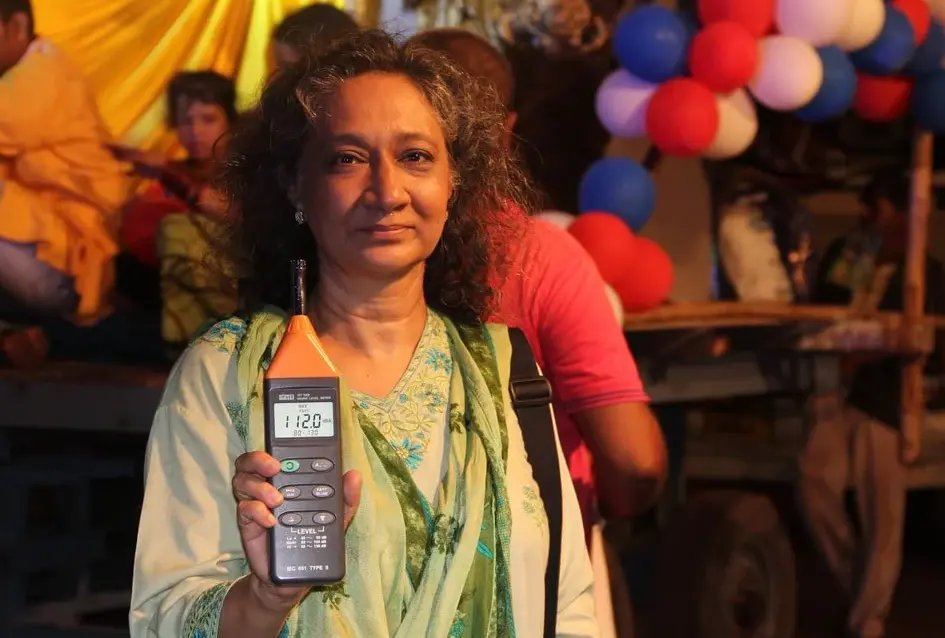Address
304 North Cardinal St.
Dorchester Center, MA 02124
Work Hours
Monday to Friday: 7AM - 7PM
Weekend: 10AM - 5PM

In the cacophony of Mumbai’s relentless urban symphony, one woman stands as a sentinel of silence. When Sumaira Abdulali’s noise meter registered 123 decibels in one of Mumbai’s streets—more than double India’s permitted maximum of 55 decibels, she didn’t just shake her head in dismay. She transformed that moment into a decades-long crusade against one of India’s most overlooked environmental hazards. Through her groundbreaking work in noise pollution activism, Sumaira Abdulali has emerged as the nation’s leading voice in the fight against acoustic contamination, proving that environmental activism extends far beyond traditional conservation efforts. Her relentless dedication to pollution activism has not only reshaped public awareness but also influenced policy changes that protect millions of citizens from the invisible threat of excessive noise.
Born on May 22, 1961, in Mumbai, Sumaira Abdulali’s journey into environmental activism began unexpectedly through family influence. Abdulali was inspired to become a noise crusader because of her uncle, who was doing policy research in Mumbai on noise pollution. She was a full-time mother when she began volunteering with him in 2002. He died shortly after, and Abdulali took up his mantle. This personal connection to noise pollution research would prove to be the catalyst for her transformation from concerned citizen to prominent environmentalist.
Her early exposure to environmental issues came through her association with established institutions. She was co-chairman of the Conservation Subcommittee and honorary secretary of Asia’s oldest and largest environmental NGO, the Bombay Natural History Society, and was a Governing Council Member between 2008 and 2021. This institutional grounding provided Abdulali with the technical knowledge and network necessary to launch her independent environmental initiatives.
The turning point came when Abdulali witnessed firsthand the environmental degradation around her ancestral home. She opposed illegal sand mining through advocacy and legal interventions since 2003, when she noticed illegal sand mining outside her ancestral home at Kihim Beach in Alibag. This personal encounter with environmental destruction broadened her activism beyond noise pollution, establishing her as a multi-faceted environmental advocate.
Sumaira Abdulali’s contributions to pollution activism have been both innovative and measurable. Awaaz Foundation was founded on 21 February 2006 by Sumaira Abdulali, a well-known environmentalist, who has exposed many scandals of environmental villainy in India at personal risk. Through this organization, she has systematically approached noise pollution with scientific rigor previously unseen in Indian environmental activism.
Her methodology revolutionized how noise pollution is documented and addressed in India. Awaaz Foundation systematically collected noise pollution data for the first time in India, establishing a precedent for evidence-based environmental advocacy. This data-driven approach has proven instrumental in legal victories and policy changes affecting millions of urban residents.
The scope of Abdulali’s work extends beyond documentation to practical solutions. In 2009, the High Court accepted… The state government asked the municipal bodies to create silence zones. Her legal interventions have resulted in tangible policy implementations, including the establishment of designated quiet areas in one of the world’s noisiest cities.
Recognition of her work has come from prestigious international platforms. Through her organization, Awaaz Foundation, she has successfully proven that noise pollution can be addressed through systematic citizen-led initiatives, earning her selection as an Ashoka Fellow. Through legal interventions and public campaigns, notably noise pollution and sand mining she has won national and international awards for her work.
Her media collaborations have amplified public awareness significantly. She helped shape a 6-month awareness campaign against noise pollution in partnership with the Times of India in 2016, worked with other journalists and contributed articles towards the campaign. This strategic approach to media engagement has been crucial in mainstreaming noise pollution as a serious environmental concern.
While noise pollution remains Abdulali’s primary focus, her environmental activism encompasses broader pollution concerns. Her courage in confronting powerful interests became evident when she was physically attacked during a sand mining site inspection in 2004. This incident led to the creation of Movement against Intimidation, Threat and Revenge against Activists’ (MITRA), demonstrating her commitment to protecting fellow activists.
Sumaira Abdulali has been referred to as “India’s foremost campaigner against illegal sand mining” by the Press, highlighting her dual expertise in addressing multiple forms of environmental degradation. Her work has brought international attention to issues that were previously considered local problems, with Sand mining, which has now become an issue of global concern was first reported by her to the authorities.
Today, Sumaira Abdulali continues to advocate for comprehensive pollution control measures while building institutional capacity for environmental protection. Despite the victories recorded since 2002 and the government corporation, the activist believes a lot needs to be done in terms of noise pollution. Unless the citizens take a firm stand and observe the rules diligently and the government introduces better monitoring mechanisms, the problem will persist.
Her current focus includes expanding citizen participation in environmental monitoring and strengthening legal frameworks for pollution control. Through Awaaz Foundation, she continues to document environmental violations while building a network of trained activists capable of replicating her methodology across different regions.
Sumaira Abdulali’s transformation of noise pollution from an ignored nuisance to a recognized public health crisis represents a paradigm shift in Indian environmentalism. Her scientific approach, legal acumen, and unwavering commitment have established new standards for pollution activism, inspiring a generation of environmentalists to tackle previously overlooked forms of environmental degradation. Through her pioneering work, Sumaira Abdulali has proven that effective environmental advocacy requires not just passion, but also precision, persistence, and the courage to challenge entrenched interests that prioritize development over public health.